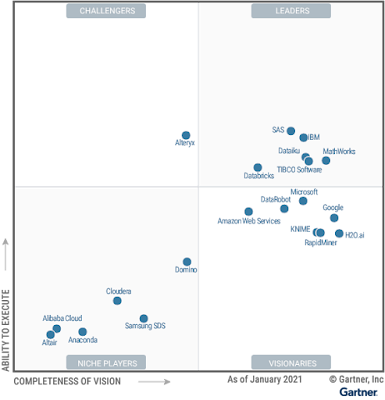Gartner Magic Quadrant for Data Science and Machine Learning Platforms 2021
This report assesses 20 vendors of platforms that data scientists and others can use to source data, build models and operationalize machine learning. It will help them make the right choice from a crowded field in a maturing DSML platform market that continues to show rapid product development.
Market Definition/Description
Gartner defines a data science and machine learning (DSML) platform as a core product and supporting portfolio of coherently integrated products, components, libraries and frameworks (including proprietary, partner-sourced and open-source). Its primary users are data science professionals, including expert data scientists, citizen data scientists, data engineers, application developers and machine learning (ML) specialists.
The core product and supporting portfolio:
- Are sufficiently well-integrated to provide a consistent “look and feel.”
- Create a user experience in which all components are reasonably interoperable in support of an analytics pipeline.
The DSML platform:
- Offers a mixture of basic and advanced functionality essential for building DSML solutions (primarily predictive and prescriptive models).
- Supports the incorporation of these solutions into business processes, surrounding infrastructure, products and applications.
- Supports the sustainable consumption of insights derived from the platform, and offers functionality to quantify and track the value of data science projects.
- Supports variously skilled data science professionals (“data scientist” is an inconsistently applied job title and professional distinction) — a DSML platform’s user base is often made up of professionals with diverse technical and business backgrounds.
- Supports multiple tasks across the data science life cycle, including:
- Problem and business context understanding
- Data ingestion
- Data preparation
- Data exploration
- Feature engineering
- Model creation and training
- Model testing
- Deployment
- Monitoring
- Maintenance
- Data and model governance
- Explainable artificial intelligence (XAI)
- Business value tracking
- Collaboration

Comments
Post a Comment